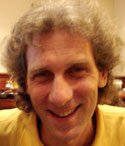I had breakfast with a very interesting man in Buenos Aires named Dario Fainstain. He is an engaging and committed man in his early 40s who is working to help people through training their ‘voice’ to resonate with deeper truths and larger possibilities. I don’t pretend to know or grasp his work fully, but wanted to share some of it as I see it might relate to growing older.
Dario was raised singing and chanting in his synagogue. He trained to sing opera and later became a psychologist, studied bioenergetics and became a Neo-Reichien therapist. He has created the Proyecto Ruaj (in Spanish) as a vehicle for people to connect with their inner sources of energy and creativity. His work seems to build on ideas and practices from the Buddhist and Vedic traditions, Jewish and Christian mysticism, Riechian and transpersonal psychology and his experience as a professional vocalist.
While I may have missed something in translation, I was impressed by how clearly he was able to link how the human voice and our bodies connect with many of the intellectual or philosophical ideas we’ve talked about in terms of empowering people to create their future, transform the culture and invent the rest of their lives. I can’t do his thinking justice, although I look forward to experiencing it in the future. For now, I am wondering if there is a relationship between how successfully we age and our voice as we grow older. Certainly, we can ‘hear’ a difference in the voices of most older persons. Yet, when I think about many of the most inspiring role models of conscious aging, their voices seem to continue to reflect their vital energy and ‘presence’.
If I listen to my own voice when I am ‘at my best’—feeling powerful, confident and creative—it is a voice that is present, clear, engaged and committed. When I record my voice at times when I am being guarded, domineering or afraid, it is tentative and fairly weak. It sounds to my ear like a totally different person: one is being authentic and fully present, the other is hiding or attempting in one way or another to control himself or others and the environment. From this self-observation and from working with people in workshop settings, I see an obvious relationship between our speaking, our connection to our creativity and energy and how we are relating to the world.
At the end of my conversation with Dario, we came to the mutual realization that we were not talking about sound at all, but were sharing our awe and appreciation for silence—not the absence of sound—as the possibility of being alive and conscious of the miracle that life is and can be. As we parted, I felt serene and happy to have met a fellow traveler whose life is so clearly about service and love. I was also inspired by how each of us has something to contribute to the whole in creating a world that works for everyone.
I don’t know what Dario’s plan for his work are, but it offers some interesting possibilities as a therapeutic approach for empowering older persons. I wonder how many other new approaches for personal empowerment and transformation are emerging as a critical mass of humanity enters ‘the second half’ of life? If you hear of any ideas for self-empowerment you find interesting or particularly useful to you personally, please share them with us by submitting a comment or a story.

